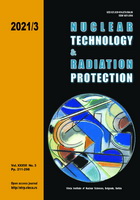
RADIATION SAFETY ASPECTS OF 90Y BREMSSTRAHLUNG RADIATION PRODUCED FROM RADIATION SHIELDING APPARATUS USING THE MONTE CARLO SIMULATION

Vol.
XXXVI, No. 3, Pp. 211-298
September 2021
UDC 621.039+614.876:504.06
ISSN 1451-3994
Pages: 255-260
Authors: Chayanit Jumpee, Chanakarn Onnomdee, Putthiporn Charoenphun, Phiphat Phruksarojanakun, and Krisanat ChuamsaamarkkeeAbstract
Selective internal radiation therapy using an 90Y labelled microsphere is increasingly used to treat hepatocellular carcinoma. Based on its properties, 90Y can produce bremsstrahlung radiation which is essential for post-treatment localisation and dosimetry. However, bremsstrahlung radiation could lead to an increase of radiation exposure of radiation workers. The aim of this work was to determine the 90Y bremsstrahlung radiation produced from the polymethyl methacrylate radiation shielding apparatus using the Monte Carlo simulation.
A scintillation detector with a 137Cs standard source was used to validate the Monte Carlo simulation. After validation, the 90Y bremsstrahlung photons spectrum produced from the radiation shielding apparatus was simulated. The radiation equivalent dose rates to the head, neck, body, lower extremities at a distance of 30 centimeters, and finger (contact with the knob) were estimated to be 4.9 ± 0.6, 6.2 ± 0.1, 18.9 ± 0.4, 13.1 ± 0.6, and 3900 ± 50 µSvh–1, respectively. The corresponding annual doses exceeded the limit when radiation workers performed 2631, 1563, 769, and 515 cases per year with contact the knob 3, 5, 10, and 15 minutes per case, respectively. The simulation result showed that radiation exposure of radiation workers and the number of selective internal radiation therapy procedures performed should be considered.
Key words: Monte Carlo, SIRT, 90Y, bremsstrahlung, radiation safety, radiation equivalent dose rate
FULL PAPER IN PDF FORMAT (559 KB)